As of 2024, the U.S. has 45 million rental units and 52,000 self-storage facilities. In New York City and Los Angeles alone, there are more than 84,000 active Airbnb listings. Meanwhile, there are countless commercial, industrial, and retail properties across the country. Together, these are some examples of the many different real estate asset classes.
Investor strategies include flipping, wholesaling, raising capital, building rental portfolios, and everything in between. No matter where you fit or what asset class you invest in, the right software can give you an advantage.
What are real estate tools for investors?
Real estate tools are software solutions that help you run and grow your investing business. They replace manual processes like:
- Repetitive tasks
- Recording information
- Researching data
- Calculating financial details
- Stakeholder notifications
These tools support every part of the real estate deal flow, including finding deals, underwriting to determine the right purchase price, managing operations, raising capital, and investor engagement.
Top 10 real estate tools for investors in 2026
The right tools can make your real estate investing business more efficient and scalable. Here are ten worth considering for 2026.
1. Agora
Agora helps commercial real estate investment managers manage fundraising, investor relations, and reporting in one platform. It’s a complete real estate investment management solution that offers:
- CRM: Manage all your investor records in one place with an investor CRM. Easily reach out to potential investors when you have new opportunities and share project details. For current investors, view their investments, communication history, and distribution status to personalize your interactions.
- Digital subscriptions: Once an investor commits to a project, onboarding is simple. A guided questionnaire takes them through the process, including automated accreditation checks and fund collection. You can also track status and step in if an investor gets stuck.
- Investor Portal: Your investors can view the status of their investments and returns through a centralized portal. This builds trust and strengthens the relationship by giving them easy access to information. It also saves you time by reducing the number of questions you need to answer, since investors can find what they need on their own.
- Distribution automation: When it’s time to send returns to investors, the waterfall calculator makes it easy to allocate distribution amounts without using spreadsheets. From there, Agora automates the distribution of payments directly into investor bank accounts.
Agora’s pricing starts at $749 per month and supports real estate investors of all sizes, from a single project to portfolios with hundreds of properties and thousands of investors.
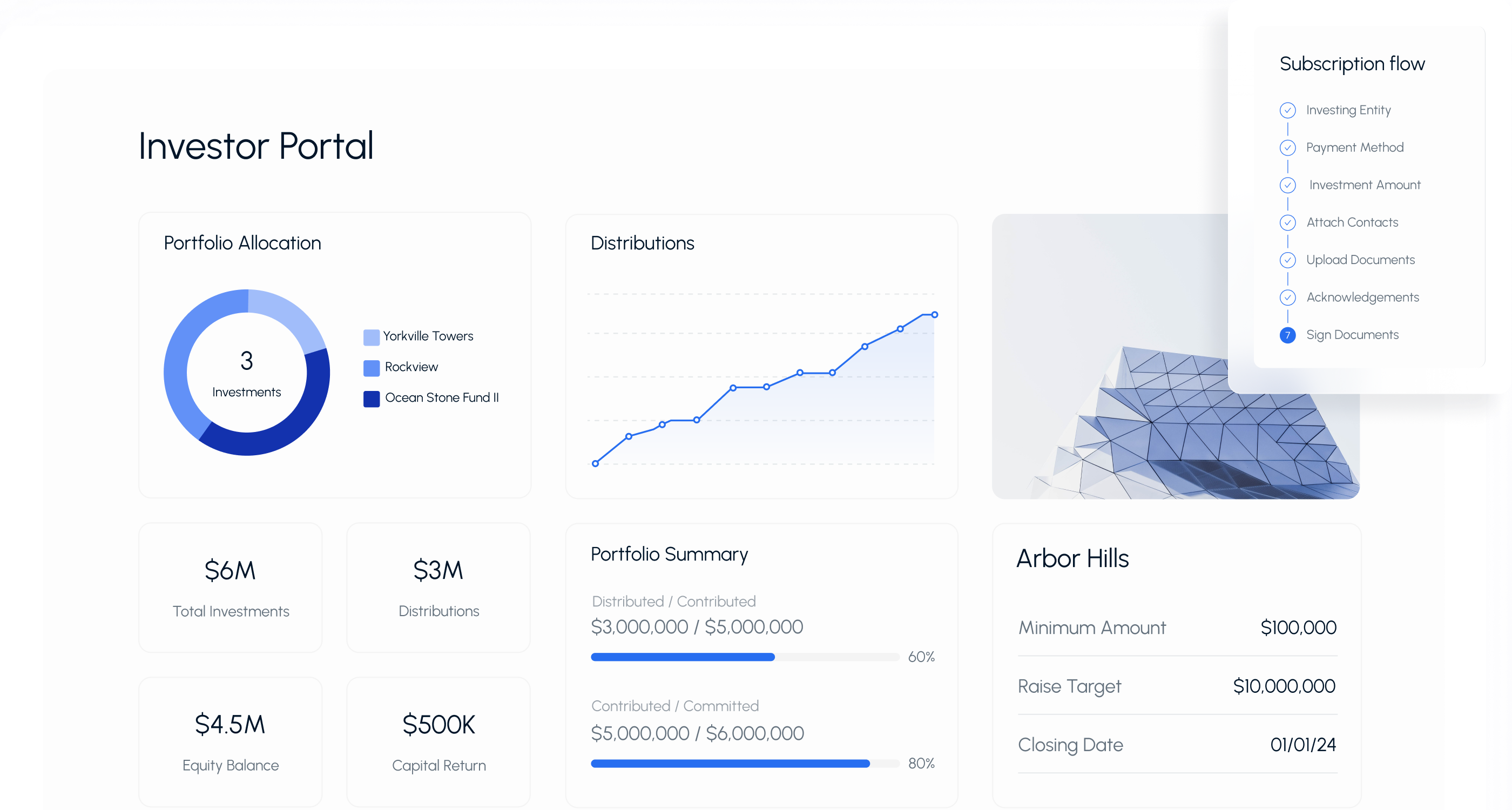
2. Stessa
Rental property investors with single-family rentals or multifamily properties use tools like Stessa to manage operations and track financial performance.
- Tenant screening: Automated tenant screening makes it easier to find the right tenants for your rental properties.
- Rent collection: Set up methods to automatically collect rent payments and track status to make sure you’re maximizing cash flow.
- Financial tracking: Monitor key financial metrics, such as income, maintenance costs, and other expenses, that impact the performance of your rental properties.
Stessa has a free plan for real estate investors who are starting out with single-family homes or multifamily properties. If you need additional features, the paid plans start at $15 per month.
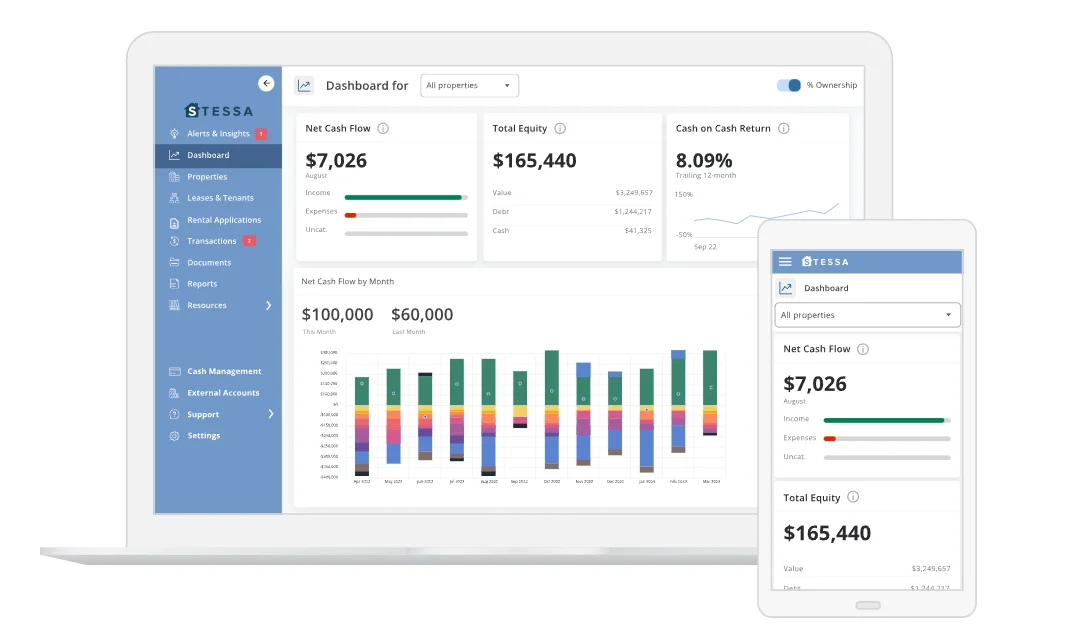
3. Reonomy
Reonomy gives investors access to comprehensive real estate data across the U.S. to help find off-market opportunities and analyze comparable properties. Features include:
- Property search tools: Investors can identify potential deals by narrowing down properties by location, building characteristics, and transaction history.
- Predictive analytics: Real estate investors can proactively target an investment property based on the likelihood of the current owner selling.
- Contact information: Reonomy provides contact details for the property owners, making it easier to reach out when you spot a good deal.
Reonomy doesn’t publish pricing on its website, but it does offer a free trial so you can test if the solution fits your real estate investment business.

4. DealMachine
DealMachine helps residential investors find opportunities. It supports wholesalers, flippers, and buy-and-hold investors with these capabilities:
- Deal sourcing: If you drive for dollars, the mobile app lets you quickly pull up property details and assess potential deals on the spot.
- List building: Create a lead list using filters to fit your specific investment criteria so that you can find and contact property owners.
- Contact automation: Simplify seller outreach with tools like an AI-dialer for cold calls or direct mail sequences.
DealMachine starts at $119 per month and scales from there as you add enhanced features and capabilities.
 5. Mashvisor
5. Mashvisor
Mashvisor is one of the best real estate tools for analyzing short-term rentals. It supports the specific data needs of this market niche with functionality like:
- Property search: Use this real estate analysis software to find properties matching your investment criteria.
- Airbnb analytics: Get access to local market data like average nightly rates and occupancy levels.
- Investment calculators: Leverage investment property calculators to evaluate opportunities that can best maximize returns.
Mashvisor starts at $24.99 per month with an annual plan.
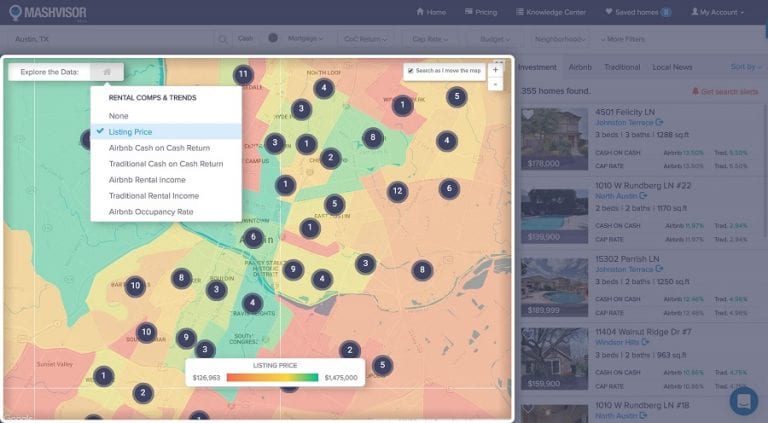
6. Valuate by REFM
Valuate by REFM is a real estate analysis software for residential and commercial properties. It helps underwrite assets like self-storage, multifamily, industrial, and office properties. You can use this tool for:
- Detailed financial analysis: Input rental income, operating expenses, hold period, loan terms, and other key data.
- Interactive scenarios: Model potential rent growth and occupancy rates to evaluate net operating income potential and possible risks.
Valuate has a free property analysis tier that lets real estate investors evaluate up to two properties. The paid plans start at $19 per month.

7. PropStream
Residential and commercial real estate investors can use PropStream to pull property data and analytics. Use it for:
- Research: Use filters to find multiple properties that meet your investment criteria, such as mortgage financing details, property conditions, and ownership status.
- Market data: Understand market value and property details like sales history, property taxes, and predictive analytics.
- Lead generation: Propstream can help investors seize opportunities with contact lists and built-in marketing tools like postcard generators to reach out to motivated sellers.
PropStream starts at $99 per month and offers add-on options for increased functionality.

8. TheAnalyst PRO
TheAnalyst PRO helps commercial real estate investors analyze and market properties with tools to help with:
- Financial modeling: Analyze rental properties with discounted cash flow modeling, CAP rate analysis, and a 1031 Exchange calculator.
- Risk assessment: Evaluate location risk information, like FBI crime data and environmental records.
- Marketing automation: Create an offering memorandum for investment partners with property reports, infographics, maps, and project details.
TheAnalyst Pro is $99.99 per month with a $49.99 account set-up fee.

9. AppFolio
Property managers leverage AppFolio to handle day-to-day operations, including tenant management, property accounting, and maintenance records. Key areas it supports are:
- Tenant management: Finding and screening tenants, setting up lease documents, and automating rent payments.
- Accounting: Property accounting, invoicing, and financial reporting.
- Operations: Supporting communication around maintenance requests, work order tracking, and scheduling service.
AppFolio doesn’t publicly list pricing on its website.

10. RealData
RealData offers tools for flipping, commercial real estate investing, and construction projects. These include:
- Data analysis: Investors can input property data like repair costs, after-repair value, and rent estimates to determine whether a property is a good investment.
- Milestone payments: For projects that require construction or repairs, RealData can manage milestone payments to contractors.
- Financial statements: Generate personal financial statements with balance sheets and income data.
RealData starts at $159 for a one-time purchase.

Why real estate tools matter for investors
The right real estate investing tools support your business with:
Streamlining operations and decision-making
Tools help you save time on repetitive tasks like rent collection and provide reminders for time-sensitive tasks like lease renewals and maintenance scheduling. Manually doing this is inefficient and hurts your ability to grow and scale.
The right tools can also support evaluating performance so you can make decisions about current investments and future strategies. For example, you can quickly decide if a deal makes sense or model the financial impact of capital improvements.
Enhancing data visibility and analytics
Most of the data investors use to find deals, such as pre-foreclosures, properties with tax liens, or vacant owners, is publicly available, but it takes considerable time to find, sort, and analyze. Real estate tools speed this up by pulling data from public records, lenders, and other third-party sources.
With everything centralized, you can sort, filter, and analyze deals much faster than doing it manually.
Improving investor communication and reporting
If you decide to bring in other investors to grow your business, you will need a way to manage these relationships. Without an automation tool, you end up relying on disjointed methods like emailing information, using spreadsheets to calculate returns, and fielding calls from investors with common questions.
Investor management tools present a professional image, make it easy for investors to see what’s happening with just a few clicks, and build trust for a long-term relationship.
Benefits of real estate tools
Using tools helps your business in several ways, such as:
- Centralize investment and asset management: See all your key financial metrics and operational data in one location.
- Improve compliance and audit readiness: Automate compliance tasks like investor verification, tenant screening criteria, and financial records so that you can quickly generate status reports.
- Predict property value trends and depreciation: Real estate software provides capabilities for modeling various scenarios by market and property type.
- Discover high-growth neighborhoods: Find areas that have the most potential profits based on growth and nearby amenities.
- Evaluate market demand and rent potential: Get an idea of rental and occupancy rates for specific areas.
- Identify historically profitable properties: Discover which property type performs best in each market and what variables you should look for on each deal.
- Assess structural and financial health of assets: Learn about a property’s inspection, repair, and financial history to spot great opportunities.
- Automate marketing and lead generation: Create seller lead lists and auto-call, text, email, or send postcards and other materials to find motivated sellers.
Key features of real estate tools for investors
The right features can make it easier to manage investments and grow your business. Consider the following:
| Feature | Details |
| Investor dashboards and portals | Centralized view of investment performance and distributions. |
| Automated reporting and updates | Real-time project, investor, and performance reporting. |
| Document management and e-signatures | Digital signatures and secure document storage. |
| Capital call and distribution tracking | Automated capital calculations and distribution tracking. |
| CRM and fundraising support | Investor database management and project sharing. |
| Performance analytics and benchmarking | Portfolio performance comparison and opportunity analysis. |
- Investor dashboards and portals: Provide transparency into investment performance and distribution status through one centralized location.
- Automated reporting and updates: Easily generate real-time reports on projects, investors, and performance.
- Document management and e-signatures: Enable investors to complete investment agreements with digital signatures and securely store all investor documents.
- Capital call and distribution tracking: Automatically calculate capital needed on a per-investor basis, send notices, and enable investors to easily see the status of distributions.
- CRM and fundraising support: Store potential and current investor information in a unified location, easily segment investors by characteristics, and send relevant potential projects for their secure review.
- Performance analytics and benchmarking: Compare asset performance across your entire portfolio and assess opportunities for improvements or adjustments.
What to look for in real estate tools for investors
When you are ready to choose, here are some key factors that can help you find the best fit:
- Alignment with portfolio goals: Use software that specifically supports your goals and your portfolio type, such as residential or commercial.
- Scalability as your portfolio grows: Choose software that supports future growth as you add more properties or investors, and avoid having to switch and relearn new tools.
- Data privacy and security standards: No matter which tools you choose, be sure that your data stays secure with cloud-based solutions that meet industry security standards.
- Compatibility with existing workflows: Make sure the tools you choose support and augment your process and don’t require major adjustments to how your real estate business works.
 Expert tip: Match real estate tools to investment strategy, not just asset class
Expert tip: Match real estate tools to investment strategy, not just asset class
- Fund managers should prioritize tools with waterfall automation and CRM-integrated investor portals. Agora excels here, enabling efficient capital call tracking, digital onboarding, and real-time investor reporting for LP-backed portfolios.
- Short-term rental investors should combine analytics with operational insight. Tools like Mashvisor offer nightly rate benchmarks, but pairing it with Stessa’s expense tracking sharpens cash flow clarity.
- Wholesalers and flippers need contact-first platforms. DealMachine and PropStream combine predictive analytics, list building, and direct mail outreach.
- Avoid “jack-of-all-trades” platforms for advanced use cases. Tools like AppFolio or RealData provide operational breadth, but not the performance analytics or fund management depth needed for institutional growth.
Best practices for using real estate investment tools
Once you decide on the software, here are a few best practices to get the most value:
- Integrating tools across the investment lifecycle: Depending on your business model, you’ll likely need more than one real estate tool. Use analysis tools to find deals, property management software to operate the business, and investment management software to support investors.
- Ensuring data consistency and accessibility: Set permission levels and create procedures around naming conventions and data retention.
- Regularly updating investor-facing materials: Keep your company statistics and other data updated so that investors have access to timely information.
- Training teams on dashboards and workflows: Leverage each software company’s training and support team to get the most value out of the tools.
- Aligning tech stack with long-term strategy: Add technology that supports your overall goals because temporary solutions drain resources and time.
Conclusion
Real estate tools solve specific needs across a wide range of real estate strategies and business models. If you are beginning to question your current approach and wondering if there is a better way, use this list of tools as a starting point. Evaluate your specific needs, review the available options, and choose the tools that will help you grow your business for years to come.
For those looking to raise capital or better support investors, Agora’s integrated tools help you scale faster and build lasting relationships.






![AppFolio alternatives: Best property management platforms compared [2026]](https://res.cloudinary.com/de1ep59a0/images/v1768801446/Appfolio-alternatives_cover-02/Appfolio-alternatives_cover-02.webp?_i=AA)

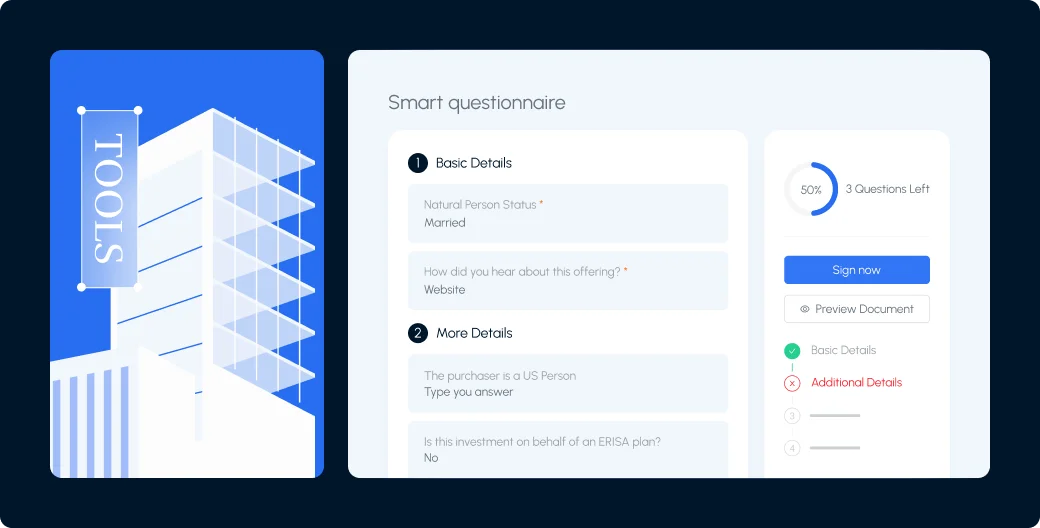
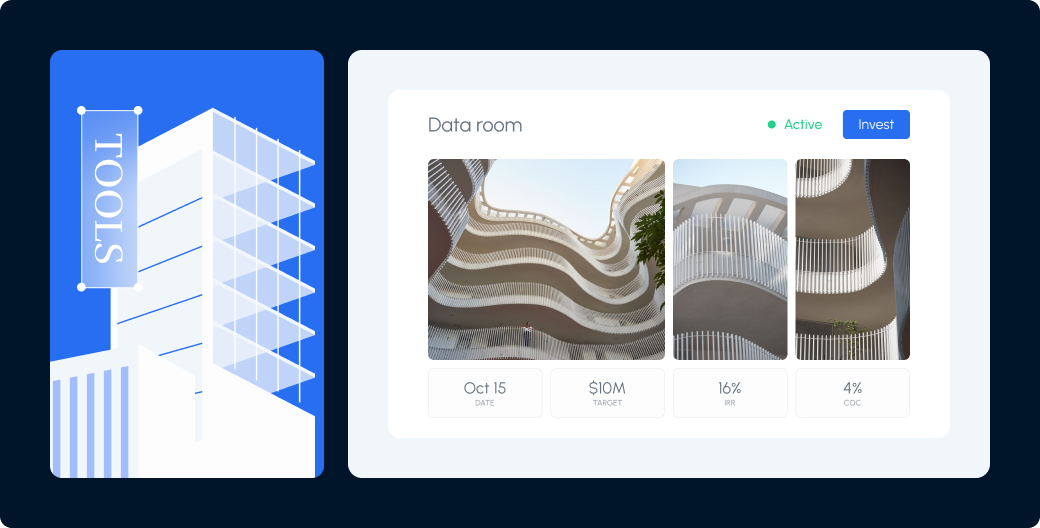

![Yardi pricing guide: Plans, features & cost comparisons [2025]](https://res.cloudinary.com/de1ep59a0/images/v1765896745/Agora-vs.-Yardi/Agora-vs.-Yardi.webp?_i=AA)